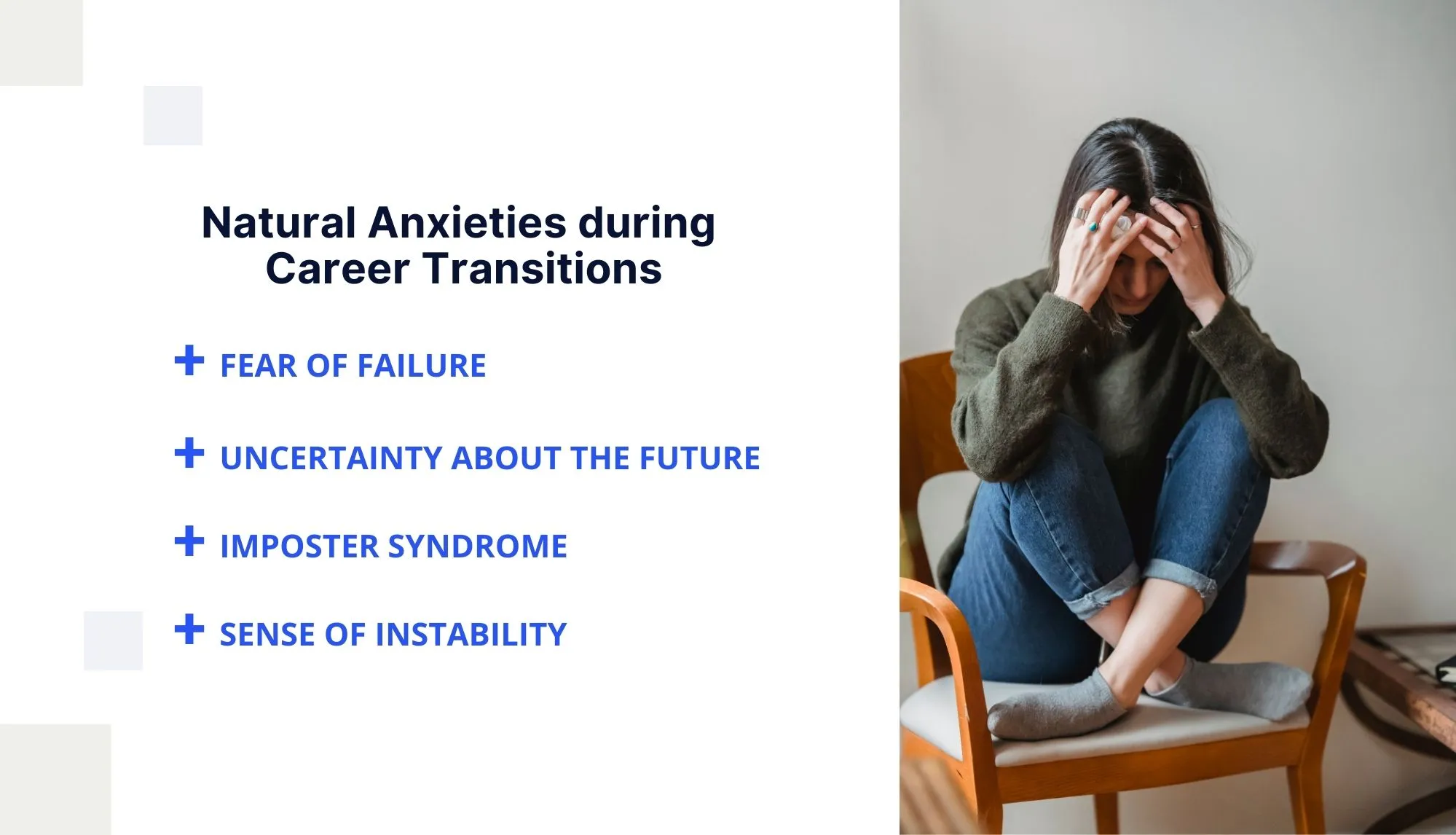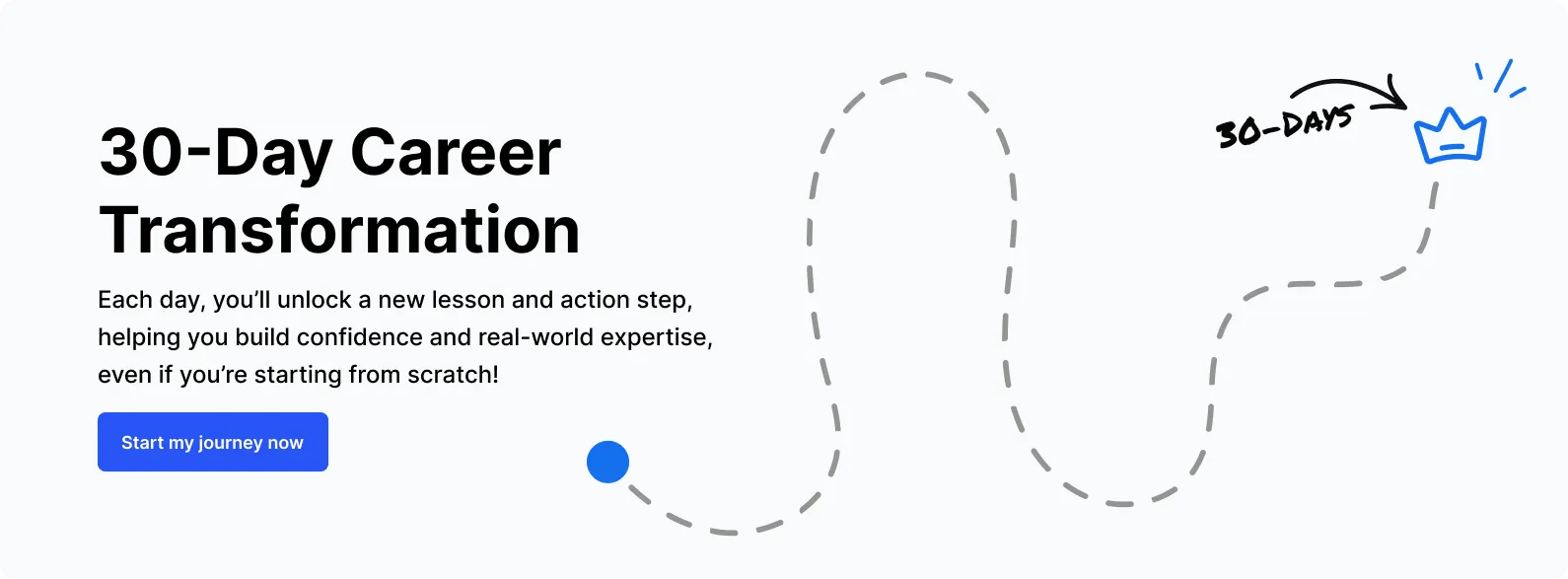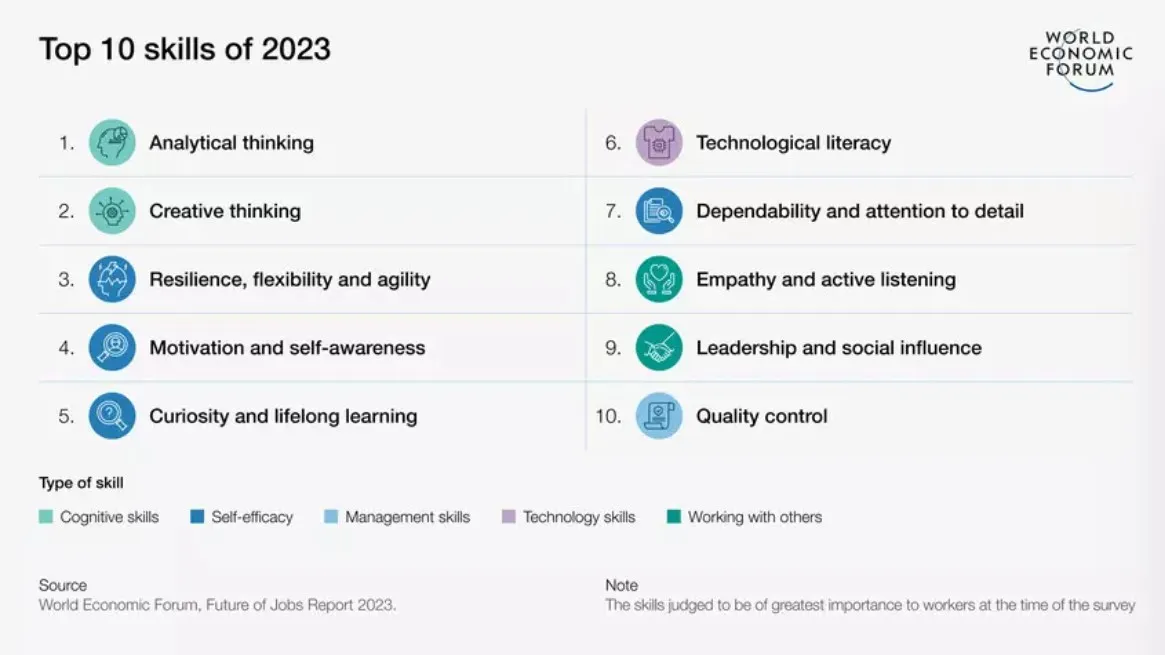Career Change Jitters? Mastering the Psychology of Transition
Taking a career leap can be exciting, but also scary. This article explores the psychology of career change and equips you with tools to manage emotions and thrive.
Table of contents

Taking a career leap can be exciting, but also scary. This article explores the psychology of career change and equips you with tools to manage emotions and thrive.
Career change is an exhilarating journey, often filled with both excitement and trepidation. Venturing into a new professional path brings the promise of growth and new opportunities but can also trigger significant psychological stress.
In recent years, career changes have become increasingly common, driven by a dynamic job market and shifting personal values. The COVID-19 pandemic has further accelerated this trend, leading many to reassess their career satisfaction and seek more meaningful, flexible, and resilient professional paths.
The Great Resignation, a term coined to describe the mass exodus of workers from their jobs during the pandemic, highlighted a significant shift in the workforce. According to a 2023 survey by McKinsey & Company, all types of employees across all income levels, are leaving their jobs, with a significant number redrawing the boundaries between their work and personal lives. This wave of career transitions underscores the importance of understanding the emotional impact of such changes.
Understanding the emotional impact of career transitions is crucial for managing the process effectively. Career changes can affect one's identity, financial stability, and mental well-being. Preparing emotionally for this shift can make the journey smoother and more rewarding. As career coach Dawn Graham states, "The emotional rollercoaster of career change is real, and managing those emotions is key to a successful transition."
This article will explore common psychological challenges faced during career changes and offer strategies to navigate them effectively.
Stepping outside your comfort zone naturally brings a wave of anxiety. It's human nature to feel uneasy when leaving behind the familiar and diving into something new. This fear of the unknown often manifests as self-doubt, where you might question your abilities and worry about the uncertainties ahead.
Consider Rina's story. After many years as a professional ballerina, she decided to switch to a career in product design. "At a point, it was kind of an insecurity, to be honest. Because after I changed careers, my accomplishments in ballet didn’t mean anything." Rina recalls. "I had to literally start from scratch."
When embarking on a new career path, you’re stepping into uncharted territory. You might feel like you’re losing your footing, unsure of what lies ahead. This feeling can be unsettling because it challenges your sense of security and control.
Managing these emotions is crucial for a smoother transition. Here are some practical tips you can follow:

According to a study by the American Psychological Association, this is a common experience; many people report increased anxiety and self-doubt during significant life changes, like switching careers.
Take Joseph Liu, a career change consultant who has been navigating career changes for the past two decades. Upon leaving the corporate world to establish his own career consultancy, he experienced self-doubt as well: “I felt like an imposter around other solopreneurs, but being around those people helped push me toward gaining the clarity, confidence, and courage I needed to launch my own venture.
The Impostor Syndrome explained by The School of Life
Overcoming self-doubt and imposter syndrome is essential for a successful career transition. Here are some practical tips to help you manage these feelings:
1. Recognize Your Thoughts
The first step in managing self-doubt is to acknowledge it. Pay attention to your internal dialogue and identify when you’re having negative thoughts about your abilities. Simply recognizing these patterns can help you begin to change them.
Interactive tools like journaling apps (e.g., Day One, Penzu) or cognitive behavioral therapy (CBT) apps (e.g., Woebot, AbleTo) can guide you in tracking and analyzing your thoughts.
2. Challenge Negative Beliefs
Once you’ve identified self-doubting thoughts, challenge them. Ask yourself if there is evidence to support these beliefs. Often, self-doubt is based on irrational fears rather than facts. Counteract these thoughts with evidence of your past successes and capabilities. Online CBT exercises and worksheets can be particularly helpful here, as they provide structured ways to dispute irrational beliefs.
3. Limit Comparison with Others
Comparing yourself to others can fuel self-doubt and imposter syndrome. Remember that everyone’s journey is unique, and what you see of others’ successes often doesn’t show the full picture. Social media management tools like StayFree or Freedom can help you limit exposure to potentially triggering content and focus on your own journey.
📌 Also read: Daily Habits for Career Transformation
Changing careers is rarely a smooth, linear journey. Obstacles and setbacks are not just possible - they’re almost inevitable.
You might find yourself struggling to adapt to a new work environment, learning unfamiliar skills, or even facing rejection during job searches. These challenges can be disheartening, but they are a natural part of the transition process.
According to research, resilience is a key factor in successfully navigating career transitions:
"Career resilience is the ability to adapt to changing circumstances, even when the circumstances are discouraging or disruptive. It involves the capacity to bounce back from setbacks, to adapt to new situations, and to keep going in the face of adversity." - “Determining Career Resilience”
Recognizing that setbacks are a natural part of the journey can help you approach them with a more resilient mindset. Here are some detailed strategies for building resilience:
1. Practice Self-Compassion: Treat yourself with the same kindness and understanding that you would offer a friend. Acknowledge your struggles without judgment. Dr. Kristin Neff's book, Self-Compassion: The Proven Power of Being Kind to Yourself, provides excellent exercises and insights to help you build self-compassion, which is essential during times of change;
2. Build a Support Network: Surround yourself with supportive friends, family, and colleagues who can provide encouragement and advice. Networking groups and professional communities can also offer valuable connections and support, enhancing your resilience by giving you a sense of belonging and shared experience;
3. Set Realistic Goals Break down your career transition into smaller, manageable steps. Setting achievable goals can help you maintain momentum and recognize progress. Using SMART (Specific, Measurable, Achievable, Relevant, Time-bound) goals can make this process more structured and manageable.
4. Embrace Flexibility and Adaptability Developing the ability to adapt to changing circumstances is crucial. Flexibility allows you to pivot when faced with unexpected challenges and to see new opportunities where others might see obstacles. Adapt: Why Success Always Starts with Failure by Tim Harford is an excellent resource that explores how embracing flexibility and learning from failure can lead to success.
5. Engage in Resilience-Building Exercises
6. Learn from Rejections Instead of viewing rejection as a failure, see it as feedback. Analyze what can be improved and apply these lessons to future opportunities. Resilience involves persistence and the ability to learn from each setback.

A growth mindset, a concept popularized by psychologist Carol Dweck, is the belief that abilities and intelligence can be developed with effort, learning, and persistence. Adopting this mindset can transform how you handle challenges:
Developing a Growth Mindset with Carol Dweck
1. Set Realistic Goals
Break down your larger career transition goals into smaller, achievable tasks. This makes the process less overwhelming and allows you to track your progress. Celebrate each small victory to maintain motivation.
2. Seek Continuous Learning
Invest in your professional development by taking courses, attending workshops, or obtaining certifications relevant to your new field. This not only improves your skill set but also boosts your confidence in your abilities.
3. Build a Support Network
Surround yourself with supportive friends, family, and mentors who can provide guidance and encouragement. Joining professional networks or online communities can also offer valuable resources and advice.
4. Stay Flexible
Be open to adjusting your plans as needed. Flexibility allows you to navigate unexpected challenges more effectively. Sometimes, detours can lead to new opportunities you hadn’t considered before.
Leaving behind a familiar career path can evoke a deep sense of grief and loss. Your career is often intertwined with your identity, shaping how you see yourself and how others perceive you. When you decide to change paths, it's natural to experience a range of emotions—from sadness and nostalgia to anxiety and uncertainty.
Amy Wrzesniewski, a professor at the Yale School of Management, says that what you do professionally is symbolic of other things. “It’s symbolic of the things you care about. It’s symbolic of your talents. It’s symbolic of your offering to the world.”

You might grieve the loss of professional relationships, the routine and structure you were accustomed to, and the sense of competence and expertise you had built over the years. This transition can feel like losing a part of yourself, leading to an identity crisis where you question your place and purpose in the professional world.
Research published in the Journal of Vocational Behavior highlights that career transitions can trigger grief-like responses. Recognizing and addressing these emotions is crucial for navigating this challenging phase effectively.
Here are some practical strategies to help you manage grief and identity loss during a career transition:
1. Reflective Journaling Start by expressing your emotions through reflective journaling. This exercise allows you to explore your thoughts and feelings about the career change, helping you process your grief.
Reflect on questions such as:
2. Mindfulness and Meditation Engage in mindfulness and meditation to help stay grounded and manage overwhelming emotions. Mindfulness practices can reduce anxiety and improve emotional regulation. Apps like Headspace or Insight Timer offer guided meditations designed specifically to address loss and transition, helping you to stay present and centered.
3. Cognitive Behavioral Techniques (CBT) Applying CBT techniques can help you reframe negative thoughts and challenge unhelpful beliefs about your identity. For example, if you’re feeling like, “I’ll never be as good at this new job,” CBT encourages you to question this belief and replace it with a more balanced thought, such as, “Learning new skills takes time, and I have successfully learned new things in the past.”
4. Therapeutic Writing Exercises Use therapeutic writing exercises to gain closure and create a vision for your future. Write a letter to your old career, expressing gratitude for the experiences and lessons learned. Alternatively, draft a letter from your future self, envisioning where you want to be and the new identity you wish to cultivate. This can help you find closure and refocus your aspirations.
1. Acknowledge Your Emotions
The first step in dealing with feelings of loss is to acknowledge them. It's okay to feel sad, anxious, or even fearful about leaving your old career. Suppressing these emotions can prolong the grieving process and hinder your ability to move forward.
Lynn Berger, a New York-based career coach, suggests “The more time you prepare yourself for this, the easier it’s going to be”.
2. Redefine Your Identity
Dr. Lisa Orbé-Austin, a psychologist in New York, says:
“If it’s the relationships, you can plan regular happy hours so that you can stay in touch. If it’s identity loss, then you can work on formulating a new sense of identity that helps repair the loss and connecting more thoughtfully to your new work identity or your new workplace.”
Shifting careers offers an opportunity to redefine your professional identity. Instead of focusing on what you’ve lost, concentrate on what you’re gaining and who you’re becoming.
3. Embrace New Possibilities
While it's essential to honor your past, embracing new possibilities can open doors to personal and professional growth.
A career change often brings significant financial implications. The shift might involve a temporary reduction in income, relocation expenses, costs for additional training or education, and other unforeseen expenditures.
These financial concerns can add a layer of stress to an already challenging transition. A well-thought-out financial plan can alleviate some of this stress and provide a clearer path forward.

1. Assess Your Current Financial Situation
Begin by taking a detailed inventory of your current financial status. Start by listing all sources of income and tracking your monthly expenses.
For instance, Maria, a marketing executive transitioning into a data analysis role, faced a significant income gap while she completed her training.
She used a monthly budget tracker to list her income and expenses, identifying areas where she could cut back. This approach allowed her to build a solid emergency fund, which proved crucial during her transition.
Example of a Monthly Budget Tracker
Additionally, review your savings, including emergency funds, and evaluate any outstanding debts using a financial snapshot template. This thorough assessment helped Maria keep her financial situation in check as she navigated her career change.
Example of a financial fnapshot template
2. Estimate Transition Costs
Identify and estimate the costs associated with your career change. These might include:
3. Create a Budget
Develop a budget that reflects your new financial reality. Ensure you have an emergency fund that can cover at least 3-6 months of living expenses.
Maria's careful budgeting allowed her to accumulate this safety net before making the leap into her new career.
Example of a Savings Plan Tracker
Establish a savings plan to gradually build up your financial cushion before making the leap. Prioritize essential expenses and find areas where you can reduce spending.
4. Risk Management
Managing risk involves preparing for uncertainties and having contingency plans. Plan for worst-case scenarios, such as longer-than-expected job searches or unexpected expenses. This includes having a robust emergency fund and flexible budgeting strategies.
Transitioning to a new career can be an overwhelming experience, fraught with uncertainty and challenges. Having a robust support system can make a significant difference in how smoothly and confidently you navigate this period.

The importance of seeking support from friends, family, and mentors cannot be overstated. Here’s why:
1. Emotional Support
Friends and family provide a crucial emotional anchor during times of change. They offer a safe space to express your fears, anxieties, and hopes. This emotional support can help reduce stress, increase feelings of security, and improve your overall mental health.
2. Practical Advice and Feedback
Mentors and colleagues who have experienced similar transitions can provide valuable insights and practical advice. They can help you navigate industry-specific challenges and avoid common pitfalls.
3. Networking Opportunities
Your support network can open doors to new opportunities through their own professional connections. Networking is essential in any career transition, providing access to potential job leads, industry events, and professional groups.
4. Accountability
A strong support system can also keep you accountable. Sharing your goals and progress with others can motivate you to stay on track and maintain focus.
During a career transition, it’s easy to be hard on yourself. As said, you might face setbacks, encounter challenges, or feel uncertain about the future.
In these moments, practicing self-compassion and positive self-talk can make a significant difference in your resilience and well-being by reducing self-criticism.
Self-care tips to apply during a career transition
Recognizing and celebrating small wins and milestones during a career change is crucial for maintaining motivation and momentum:
While it's natural to focus on big goals, acknowledging the smaller achievements along the way can provide significant encouragement and boost confidence.

Continuous learning and skill development are vital components of a successful career change. In today's rapidly evolving job market, staying competitive and confident requires a commitment to ongoing growth and adaptation.
In fact, lifelong learning is one of the top 5 skills on the rise, according to The Future of Jobs Report 2023.

For those looking to enhance their skills, especially in the tech industry, the Nocode Institute offers accessible training programs to help you stay ahead. Individuals can acquire cutting-edge abilities without traditional coding knowledge, opening up doors to exciting career paths in tech and beyond.
In conclusion, navigating a career change is a journey of personal and professional growth. Throughout this article, we've explored the emotional challenges involved and provided strategies to overcome them effectively.
It's crucial to acknowledge and manage the emotional aspects of a career change—from initial anxieties to financial concerns. Building resilience, practicing self-care, and maintaining a positive mindset are key.
As you embark on this new chapter, remember every challenge is an opportunity for growth. Embrace uncertainty, celebrate progress, and stay committed to your journey.
Ready to make your move? Dive into the resources and tools we've discussed, and take that crucial first step towards a career transformation. Equip yourself with the strategies and support necessary to turn challenges into stepping stones and shape a career that truly aligns with your aspirations.
Here's to embracing the challenges ahead and building a successful and rewarding path forward.
Looking to re-invent yourself and turn your talent into a career? Stay up to date with the latest.